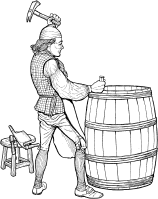Colonial America
A WebQuest for 4th Grade
Colonial Resources:
Use the Internet resources below to complete your colonial research. Please also use books from the library!
|
(Life, schools, games. toys) |
||||
|
|
||||

13 Colonies:
Colonial New York:
- A Virtual Tour of New Netherland
- Metropolitan Museum: Architecture, Furniture, & Silver from New Amsterdam
- Colonial Albany
- Colonial Long Island
Daily Life:
- Farm Life from PBS Liberty
- Christmas in Colonial America
- KidInfo: Did You Know? (scroll to bottom of page)
Trades & Occupations:
 |
|||
|
|
|
|
|
|
|
|||
|
|
|
||
|
COLONIAL LAWYER |
||
|
|
Life for Colonial Children:
What Was Life Like?
School & Education:
Apprenticeship:
The colonists established some public schools but most children of poor
families were taught by their parents at home. Because many parents could
not read or write they were unable to teach those skills. So their children
were taught obedience, religious beliefs and the skills they needed in daily
life. Boys learned how to farm, raise cattle and handle a gun for hunting.
Girls learned such household tasks as sewing, spinning, weaving, food
preparation and food preservation.
In every colony, many poor children got some education by serving as
apprentices. Under the apprentice system a boy's parents place him with a
master craftsman, tradesman or professional who taught his skills to the boy
and provided room and board. In return the boy promised to work hard, study
faithfully and be obedient and well-behaved. Girls were "bound-out" as
household servants or apprenticed to become housekeepers, cooks or needle
workers.
The first book from which the colonial children learned was not
really a book at all. It was a thin piece of wood about five inches long
with a handle. This wood was covered with a thin piece of paper attached
around the edges with a thin sheet of clear horn. The handle had a hole
through which string was strung. The hornbook was worn around the neck or
hung by the side.
On the paper was printed the alphabet, alphabet letter conbinations, Lord's
Prayer and Roman numerals.
Pens for writing were hand cut from the quill of a goose or wild turkey. The tips were sharpened with a knife. The sharp tips were then dipped into ink for writing. Only a few symbols could be written before the quill needed to be dipped again. Writing with a quill was a very time consuming task!
The children of rich colonists attended private schools or were educated by provate teachers called tutors. New England had many private schools called dame schools. Women, often widows, held these schools in their own homes. Church groups also operated schools. the ministers held classes in their homes. Children were taught the alphabet, spelling, writing and simple arithetic. Most of the children paid fees for their education. One of the activities the children enjoyed was a spelling bee. <Click source for author information.>
- School Life
- Education for Boys and Girls
- Education in Colonial America
- Schooling, Education & Literacy in Colonial America
- Colonial Education
Games, Recreation & Toys:
- Colonial Recreation
- Colonial Game Book
- Games in Colonial America
- Great Colonial Game Book
- Nine Men's Morris
- Fox & Geese
- Tip-Cat
- Colonial Games & Toys
 Women in
Colonial Times:
Women in
Colonial Times:
Slavery:
- Establishing Slavery in New York
- African-American Experience in colonial times
- Slavery
- Slave Quarters
Food & Recipes:
- What's for Dinner? (scroll to bottom half of page when you get to this link)
- Food in the 13 Colonies
- Colonial Recipes
- The Hungry Pilgrim's New England Style Recipes
-
Recipes
from Colonial Williamsburg
- See also "Cook Colonial Food" on the Colonial
Fair page.
- See also "Cook Colonial Food" on the Colonial
Fair page.
 Colonial
Clothes:
Colonial
Clothes:
- Colonial Clothing
- 18th Century Clothing
-
A Visual Dictionary of Early American Clothing
- See also Dressing for the Colonial Fair on the Colonial Fair page.
African
Americans
Aunt Abigail's
Cookbook
Colonial
Children
The History of the 13 Original Colonies
Archiving Early America: Early American
History Documents
Black
Life in Colonial America
Everyday Life in
Colonial America
Great Colonial
Game Book
People of
Williamsburg
Politics
in Colonial Virginia
Religion in Early Virginia
Trades of
Colonial Times
Slave

-
Chronicling Black Lives in Colonial New England
(http://www.csmonitor.com/durable/1997/10/29/feat/feat.1.html) -
Slavery Trends
(http://www.east-buc.k12.ia.us/00_01/CA/sla2.htm) -
Introduction to Colonial African-American Life
(http://www.history.org/Almanack/people/african/aaintro.cfm)
-
African
American Clothing
(http://www.history.org/history/clothing/intro/aa_cover.cfm)
Artisan

-
Trades
(http://www.history.org/Almanack/life/trades/tradehdr.cfm) -
Tradesmen Clothing
(http://www.history.org/history/clothing/intro/tradescover.cfm)
Farmer

-
Farmers
(http://socialstudiesforkids.com/articles/ushistory/13coloniesfarm.htm) -
History of American Agriculture
(http://teach1.cses.vt.edu/ch2.html) -
Men's
Clothing
(http://www.history.org/history/clothing/men/index.cfm)
Women

-
Colonial
Times: Women
(http://www.angelfire.com/ca/HistoryGals/Chloe.html) -
Women's
Clothing
(http://www.history.org/history/clothing/women/index.cfm)
Food
Colonial Life
http://www.history.org/almanack/life/life.cfm
Gunsmith
http://www.history.org/almanack/life/trades/tradegunfou.cfm
Shoemaker
http://www.history.org/almanack/life/trades/tradesho.cfm
Blacksmith
http://chalk.richmond.edu/education/projects/webquests/colonial/
A Colonial Family and Community
http://www.hfmgv.org/exhibits/smartfun/colonial/intro/index.html
Colonial People
http://www.nysm.nysed.gov/albany/gallery.html
Women
http://chalk.richmond.edu/education/projects/webquests/colonial/
http://chalk.richmond.edu/education/projects/webquests/colonial/
Children
http://www.nysm.nysed.gov/albany/children.html
http://chalk.richmond.edu/education/projects/webquests/colonial/
Completing Your Project Using Glogster